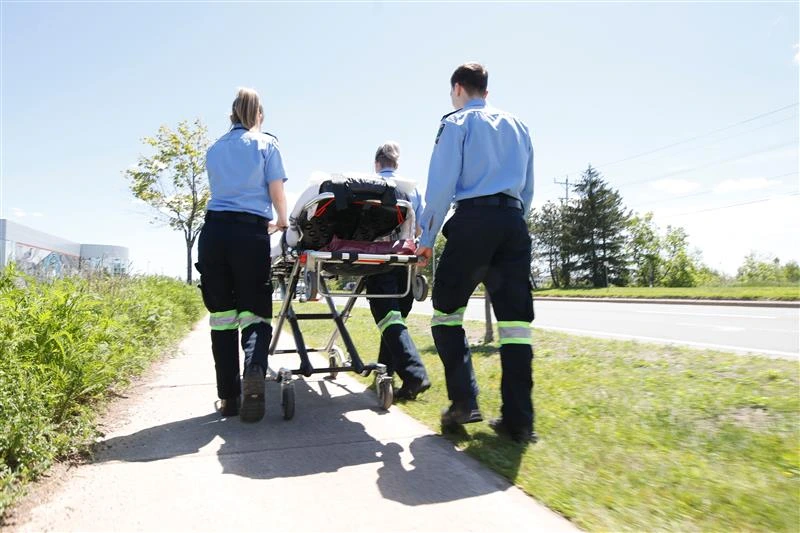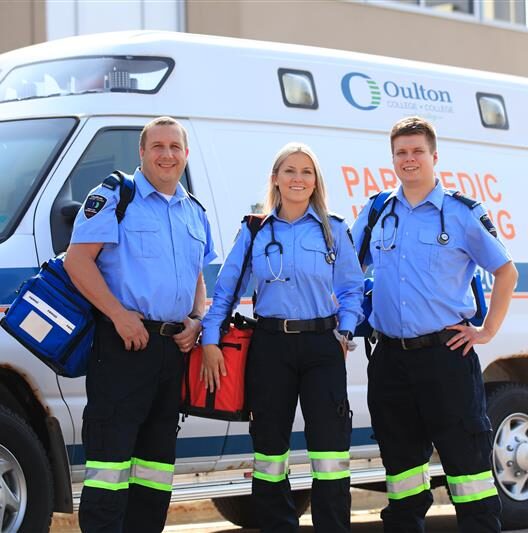Primary Care Paramedic
100% Tuition Coverage
100% Tuition Coverage
Just 15 Months Financial support Nationally Accredited 18 weeks of Practicum Hands-On Learning Small Class sizes
Hands-on Experience
18 weeks of
practicum experience
Financial Aid Support
Scholarships, Grants,
and Bursaries Available
Small Class Sizes
With Small Class Sizes,
No more than 25 Students
Flexible Start Date
Choose your intake
February or August
Program Overview
Ignite Your Career in Primary Care Paramedicine!
Are you dedicated to helping others and thriving in dynamic environments? Our 15-month nationally accredited Primary Care Paramedic Program is designed for you! Upon graduation, you’ll have the opportunity to explore diverse career paths in ground and transport medicine, industrial paramedicine, community paramedicine, injury prevention, and even with some fire departments.
This program includes practical skills training in our lab, along with 18 weeks of hands-on clinical and practicum experience in real-world settings. This ideal blend of knowledge, theory, and hands-on experience is necessary to successfully pass the accreditation exams and obtain your licensure for employment.
If you’re passionate about emergency care and making a difference, enroll today and take the first step toward a rewarding and impactful career!
*Cost breakdown: Book a meeting with one of our Admissions Advisors for a detailed breakdown of costs, tuition and financial aid available for our Primary Care Paramedic Program. They can provide tailored information and help you understand all financial aspects. Schedule your appointment today to get all the details you need!
Accreditation & Eligibility
Oulton College’s Primary Care Paramedic (PCP) Program is nationally accredited and structured to meet the competency requirements established by the Paramedic Association of Canada. Graduates are eligible to take the provincial licensing exam and, upon successful completion, can apply for licensing through the Paramedic Association of New Brunswick (PANB).


Launch Your Paramedic Career with Oulton’s Primary Care Paramedic Program
- Fast-Track to the Frontlines, Graduate in just 15 months and become a licensed Primary Care Paramedic (PCP).
- Financial Support, Scholarships and funding options available to help you succeed
- Hands-On Training, Build real-world skills through clinical placements and immersive simulations.
- Expert Instruction, Learn from seasoned paramedics and healthcare professionals.
- Supportive Learning, Benefit from small class sizes and personalized guidance every step of the way.
- Accredited & Recognized, Nationally accredited and aligned with the Paramedic Association of Canada’s standards.

Hands-On Learning That Prepares You for Real-World Emergencies
At Oulton College, Primary Care Paramedic students learn by doing. From day one, you’ll gain the practical skills, confidence, and real-time experience needed to respond to urgent medical situations through immersive, hands-on education.
- Simulation-Based Training, Practice trauma care, airway management, and patient assessment in a realistic, high-pressure environment.
- Clinical Ride-Along, Apply your skills in real-world emergency settings alongside licensed paramedics.
- Scenario-Based Learning, Respond to mock calls, assess dynamic scenes, and make critical decisions under pressure.
- Modern Equipment, Train with the same life-saving tools and technology used by paramedics across the province.
- Team-Based Training, Work closely with classmates in collaborative simulations that build trust and quick decision-making skills.
Financial Options Available
There are many funding opportunities available for students pursuing a career in healthcare. Our Financial Aid Team is here to help! Whether you’re looking for scholarships, bursaries, student loans, grants, or flexible payment plans, we’ll guide you through the process to maximize your financial support.
Canada Student Grant for Full-Time Students
$525 per month of study
New Brunswick Student Loan
Up to $200 per week of study
Canadian Student Loan
Up to $300 per week of Study
Oulton College Memorial Scholarship
Up to $1,000
New Brunswick Bursary
Up to $160 per week of study
Renewed Tuition Bursary
$1,500 for college students
Canada Student Grant for
Students with Disabilities
$2,800 per academic year if applicable
Canada Student Grant for Services and Equipment – Students with Disabilities
Up to $20,000 per academic year
Canada Student Grant for
Full-Time Students with Dependants
$280 per month of study per child
Our financial aid advisors are ready to help you.
Career Opportunities
Paramedicine is one of the most vital and fast-growing fields in Canada’s healthcare system. As a graduate of Oulton College’s Primary Care Paramedic program, you’ll be eligible to write the provincial licensing exam and begin working as a licensed Primary Care Paramedic (PCP).
PCPs play a critical role in emergency response teams, with opportunities to work in ambulance services, fire departments, hospitals, remote medical units, and private emergency care providers. This career path offers strong job stability, a fast-paced environment, and the chance to save lives and make a direct impact in your community every day. For current job openings and salary expectations, visit NBJobs.ca.

Admissions Requirements
- Grade 12 Diploma, Adult Diploma or GED.
- Grade 11 or 12 Biology* with a minimum average of 65%.
- Grade 11 or 12 Math* with a minimum average of 65%.
- Grade 11 or 12 English* with a minimum average of 65%.
- 19 years of age prior to commencement of practicum.
- Meeting with an Admissions Advisor.
- Valid driver’s license no later than 30 days after program start date.
- Successful completion of the health science application process.
*Courses marked with an asterisk (*) must be completed at the academic level.
International students whose first language is not English must submit proof of English language proficiency, unless they have completed a minimum of three years of study at a school where English is the language of instruction. Please see the international application process here.
Frequently Asked Questions:
What is the Primary Care Paramedic (PCP) program at Oulton College?
Oulton College’s PCP program in Moncton, NB, is a nationally accredited, 15-month paramedic course designed to prepare students for dynamic careers in emergency medical services. As a leading paramedic school in Atlantic Canada, Oulton blends classroom instruction, simulation labs, and clinical placements to ensure students are job-ready and meet provincial licensing standards.
How long is the PCP program at Oulton College?
The program runs full-time over 15 months and includes 18 weeks of clinical and practicum experience. This extended format allows students more time to develop and refine their paramedic skills before entering the workforce.
What are the career opportunities for Primary Care Paramedics in New Brunswick?
Graduates of the PCP program can pursue careers in ground ambulance services, industrial paramedicine, community paramedicine, emergency departments, and even fire services. In Moncton and across New Brunswick, demand for trained paramedics continues to grow, especially for bilingual professionals.
Is the PCP program at Oulton College accredited?
Yes. The Primary Care Paramedic program is nationally accredited, ensuring it meets the standards required for licensure and employment across Canada.
What kind of hands-on experience will I get in this program?
Students train using real ambulances and modern simulation labs. The program includes 18 weeks of clinical and practicum placements in real emergency medical settings, giving students the confidence and experience needed to succeed in the field.
What are the admission requirements for the PCP program?
Applicants typically need a high school diploma with strong grades in English, Math, and Science. Additional requirements may include an interview, medical clearance, and CPR certification. Meeting with an Admissions Advisor is important to review all criteria has been successfully met .
Can international students apply to the PCP program?
No. Permanent residence students are welcome and must meet English language proficiency requirements unless they’ve studied in an English-instruction school for at least three years.
What happens after I graduate from the PCP program?
Graduates are eligible to write the provincial paramedic licensing exam. Once licensed, they can begin working as Primary Care Paramedics in New Brunswick or other provinces. This paramedic course also provides a strong foundation for those interested in advancing to Advanced Care Paramedicine or related healthcare fields.
Please Note: Content is subject to change by administration as required to meet program and profession standards.
Why Choose Oulton College
Best Canadian Paramedic School
Proudly Canadian since 1956
We've built a strong network, ensuring graduates are career-ready in healthcare.
Financial Support
We offer scholarships, bursaries, and flexible payment options.
+ 90% Success Rate
Over 90% placement rates for all program.
Career Services
Our team connects you with employers and helps with resumes and job-market skills.
Campus Facilities
Train in state-of-the-art medical labs with the latest medical technology.
Industry Partnerships
We partner with healthcare providers to offer placements and job opportunities.
Student Services
24/7 free counseling services, academic support, and one-on-one guidance.
In-person Classes
Primary Care Paramedic is a hands-on career. Choose in-person learning to stand out
Get the Full Program Details
Want to learn more about our Primary Care Paramedic (PCP) program? Download our detailed program guide to explore course curriculum & program structure.

